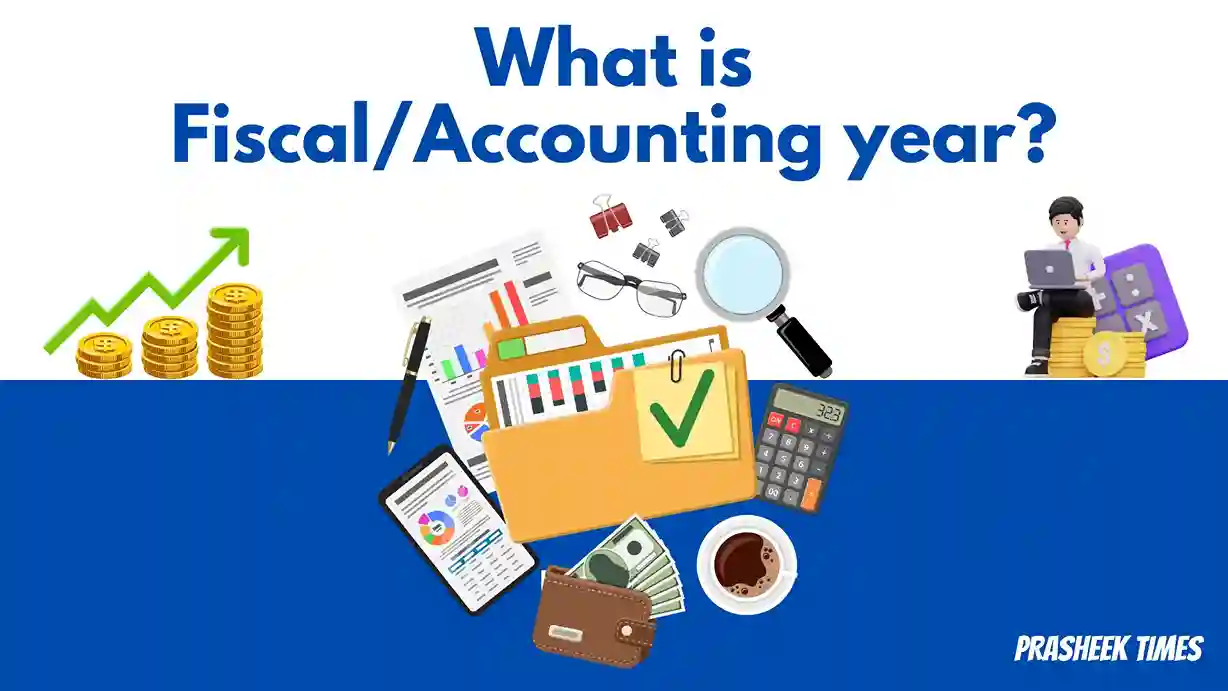What is an Accounting year: A year from 1st April to 31st March.
Meaning of Accounting Year:
An accounting year is a year which starts from April 1st and ends on 31st March. It is full of 365 days (12 Months), it is also known as accounting period. Accounting year is made specially for organizations and for Governments so that in that span of twelve months, companies can calculate their accounts that are all financial things, and which are summarized in Financial Reports.
It is known by many names like Accounting Year, Fiscal Year, Accounting Period, Financial Year, Budget Year, etc.
A Financial year from April 1st till 31st March is in India, many countries have different starting and endings but it’s a span of 12 months only.
Who defined the accounting year period in India:
India: The East India Company introduced the concept of the financial year running from April 1st to March 31st while they were ruling undivided India.
In United States: The American Association of Public Accountants (AAPA) was established in 1887, and the accounting profession was formally recognized in 1896 with the establishment of the professional title of Certified Public Accountant (CPA)

Different types of years:
| Year names | Explanations |
| Calendar Year | The Gregorian calendar, which is the modern calendar used globally, defines a calendar year as either a common year with 365 days or a leap year with 366 days |
| Astronomical Year | An astronomical year refers to the time taken for astronomical objects (such as Earth) to complete one orbit around the Sun. |
| Seasonal Year | It marks the passing of seasons, five seasons are generally recognized: spring, summer, autumn, rainy and winter. |
| Fiscal/Accounting Year | The fiscal/accounting year is used for financial and accounting purposes. |
| Academic Year | The academic year corresponds to the duration of educational programs. (In India usually spans from June to March. |
| Lunar Year | The lunar year is based on the Moon’s cycles. It is approximately 354 days long, corresponding to 12 lunar months. |
| Sidereal Year | The sidereal year is the time it takes for Earth to complete one orbit around the Sun with respect to the fixed stars. It is slightly longer than the tropical year due to the precession of Earth’s axis. |
| Solar Year (Tropical Year) | The solar year, also known as the tropical year, is the time it takes for the Sun to return to the same position in the cycle of seasons. |
Accounting Year Defination:
A financial time (or fiscal time, or occasionally budget time) is used in government account, which varies between countries, and for budget purposes. It’s also used for fiscal reporting by businesses and other associations. Laws in numerous authorities bear company fiscal reports to be prepared and published on a periodic base but generally with the reporting period not aligning with the timetable time (1 January to 31 December). Taxation laws generally bear account records to be maintained and levies calculated on an periodic base, which generally corresponds to the financial time used for government purposes.
The computation of duty on an periodic base is especially applicable for direct levies, similar as income duty. numerous periodic government freights similar as council duty and license freights, are also levied on a financial time base, but others are charged on an anniversary base.
Some companies, similar as Cisco Systems end their financial time on the same day of the week each time the day that’s closest to a particular date for illustration, the Friday closest to 31 December. Under such a system, some financial times have 52 weeks and others 53 weeks.
The timetable time is used as the financial time by about 65 of intimately- traded companies in the United States and for utmost large pots in the United Kingdom. That’s the case in numerous countries around the world with many exceptions similar as Australia, New Zealand, and Japan. Numerous universities have a financial time which ends during the summer to align the financial time with the academic time and, in some cases involving public universities, with the state government’s financial time) and also because the university is typically less busy during the summer months.
In the Northern Hemisphere, that’s July to the coming June. In the Southern Hemisphere, that’s the timetable time, January to December. In a analogous fashion, numerous nonprofits performing trades associations will have a financial time which ends during the summer, so that their performance season that begins in the fall and ends in the spring will be within one financial time.
Importance of accounting year:
The accounting year, or fiscal year, is vital for businesses for several reasons:
- Financial Reporting: It structures financial statement preparation, offering insights into a company’s financial health.
- Taxation: Aligning with tax years facilitates tax compliance and management.
- Budgeting and Planning: Provides a timeframe for setting goals, allocating resources, and tracking performance.
- Comparative Analysis: Allows meaningful comparisons of financial data over time for decision-making.
- Auditing and Compliance: Simplifies audits and ensures regulatory compliance.

In short, the accounting year is essential for financial management, reporting, and decision-making processes in businesses.
History of Accounting:
- From the ancient time of Mesopotamia development of accounting was started it was closely related to developments in writing, counting and money, and early auditing systems by the ancient Egyptians and Babylonians.
- In India Chanakya from the Mauryan Empire he wrote a manuscript similar to a financial management book. His book Arthashastra contains few detailed aspects of maintaining books of accounts.
- Luca Pacioli, The Father of accounting and bookkeeping was the first person to publish a work on double-entry bookkeeping, and introduced the field in Italy.
Accounting year’s periods in different countries:
Following are some countries fiscal/accounting year periods information:
Courtesy: Wikipedia – Fiscal year
Australia
In Australia, a fiscal year is commonly called a “financial year” (FY) and starts on 1 July and ends on the next 30 June. Financial years are designated by the calendar year of the second half of the period. For example, financial year 2024 is the 12-month period ending on 30 June 2024 and can be referred to as FY2023/24. It is used for official purposes, by individual taxpayers and by the overwhelming majority of business enterprises.
Business enterprises may opt to use a financial year that ends at the end of a week (e.g., 52 or 53 weeks in length, and therefore is not exactly one calendar year in length) or opt for its financial year to end on a date that matches the reporting cycle of its foreign parent. All entities within the one group must use the same financial year.
Canada
In Canada, the government’s financial year is 1 April to 31 March.
(Q1 1 April – 30 June, Q2 1 July – 30 Sept, Q3 1 Oct – 31 Dec and Q4 1 Jan – 31 Mar)
For individual taxpayers, the fiscal year is the calendar year, 1 January to 31 December.
China
In China, the fiscal year for all entities is the calendar year, 1 January to 31 December, and applies to the tax year, statutory year, and planning year.
INDIA
In India, the government’s fiscal calendar spans from 1 April to 31 March of the subsequent year, typically abbreviated as FY 2022-23 or FY22-23, among other variations. However, depending on the end year, it might also be referred to simply as FY 2023 or FY23.
For companies adhering to the Indian Depositary Receipt (IDR) system, there’s flexibility in selecting their financial year. For instance, despite being listed in India, Standard Chartered’s IDR follows the UK calendar. Companies aligning with the Indian fiscal year assess their financial status as of 31 March each year.
The inception of the current fiscal year traces back to 1867 when the colonial British government synchronized India’s financial year with that of the British Empire. Before this, India’s fiscal year spanned from 1 May to 30 April.
In 1984, the LK Jha committee suggested transitioning to a fiscal year from 1 January to 31 December. However, concerns about potential transitional challenges led the government to reject this proposal. In July 2016, a panel commissioned by NITI Aayog proposed transitioning to a calendar year fiscal cycle after the conclusion of the ongoing five-year plan.
On 4 May 2017, Madhya Pradesh declared its intent to shift to a January–December financial year, marking the first Indian state to do so. However, logistical and accounting issues later prompted the state to abandon this plan.

Singapore
In Singapore, the fiscal year for the calculation of personal income taxes is 1 January to 31 December.
The fiscal year for the Government of Singapore and many government-linked corporations is 1 April to 31 March.
Corporations and organizations are permitted to select any date as the end of each fiscal year, as long as this date remains constant. However, new companies should consciously choose their financial year end to stretch as much as a duration of 12 months as possible.
South Korea
In South Korea, the fiscal year is the calendar year, 1 January to 31 December.
Spain
In Spain, the fiscal year is the calendar year, 1 January to 31 December.
United Arab Emirates
In the United Arab Emirates, the fiscal year is the calendar year, 1 January to 31 December.
United Kingdom
In the United Kingdom, the financial year runs from 1 April to 31 March for the purposes of government financial statements. For personal tax purposes the fiscal year starts on 6 April and ends on 5 April of the next calendar year.
In Conclusion:
An accounting year is the period of time a company/government/institutes uses to keep track of its finances. It varies as per their conveniences. It’s like a big financial diary that starts on a specific date and ends on another. For example, many companies in India start their accounting year on April 1st and end it on March 31st the following year. During this time, they record all their money coming in and going out, helping them see how well they’re doing financially.
Frequently Asked Questions
What is an accounting year or fiscal year?
An accounting year is a year which starts from April 1st and ends on 31st March. It is full of 365 days (12 Months), it is also known as accounting period. Accounting year is made specially for organizations and for Governments so that in that span of twelve months, companies can calculate their accounts that are all financial things, and which are summarized in Financial Reports.
Who defined the accounting period in India?
India: The East India Company introduced the concept of the financial year running from April 1st to March 31st while they were ruling undivided India.
History of Accounting?
From the ancient time of Mesopotamia development of accounting was started it was closely related to developments in writing, counting and money, and early auditing systems by the ancient Egyptians and Babylonians.
In India Chanakya from the Mauryan Empire he wrote a manuscript similar to a financial management book. His book Arthashastra contains few detailed aspects of maintaining books of accounts.
Luca Pacioli, The Father of accounting and bookkeeping was the first person to publish a work on double-entry bookkeeping, and introduced the field in Italy
Accounting Year vs Fiscal year?
Both are one thing. It is known by many names like Accounting Year, Fiscal Year, Accounting Period, Financial Year, Budget Year, etc.
Your Queries:
What is Accounting Year, Duration of accounting year, why is accounting year important, Importance of accounting year, accounting year in different countries, who started accounting year in India.
